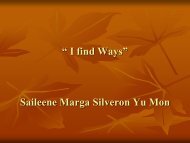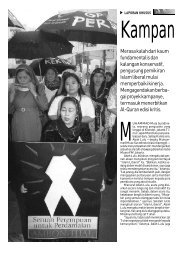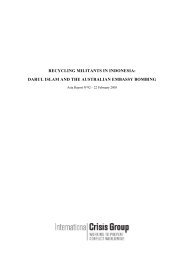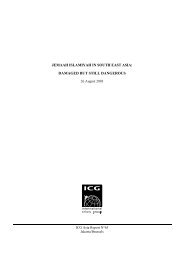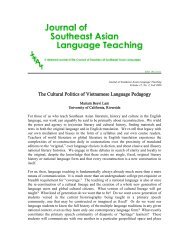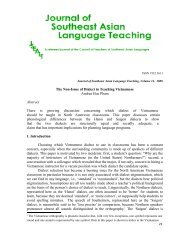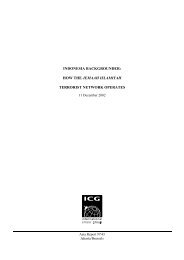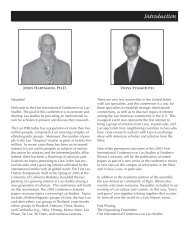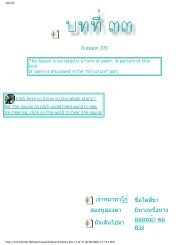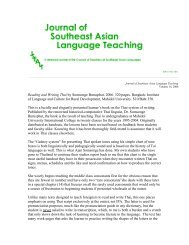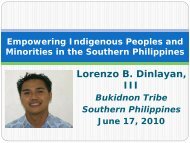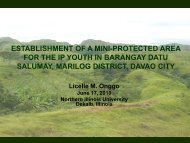Preservation of Indigenous Maranao Language towards ... - SEAsite
Preservation of Indigenous Maranao Language towards ... - SEAsite
Preservation of Indigenous Maranao Language towards ... - SEAsite
You also want an ePaper? Increase the reach of your titles
YUMPU automatically turns print PDFs into web optimized ePapers that Google loves.
Abdul Hamidullah Atar in Action
<strong>Preservation</strong> <strong>of</strong> <strong>Indigenous</strong><br />
<strong>Maranao</strong> <strong>Language</strong><br />
<strong>towards</strong> Oratory skills<br />
enhancement among<br />
future local mediators
Project Title<br />
Project<br />
Proponent<br />
<strong>Preservation</strong> <strong>of</strong> <strong>Indigenous</strong> <strong>Maranao</strong> <strong>Language</strong><br />
Towards Oratory Skills Enhancement among future<br />
Local mediators<br />
Reconciliatory Initiatives For Development<br />
Opportunities (RIDO) Inc.<br />
Project Location Lanao Province<br />
Direct<br />
Beneficiaries<br />
No. <strong>of</strong> Direct<br />
Beneficiaries<br />
Project Cost<br />
Date <strong>of</strong><br />
Implementation<br />
Total Request<br />
Budget<br />
Local Mediators, Clan and Youth leaders <strong>of</strong> the<br />
Sultanate <strong>of</strong> Madaya, Marawi, Radapan and Tara<br />
clan.<br />
12 Local Partner Mediators and 30<br />
Selected Youth Leaders<br />
July 1-December 30, 2010
Reconciliatory Initiatives For Development Opportunities (RIDO) Inc.<br />
Email<br />
pogie_atar@hotmail.com/rido2007@gmail.com<br />
Name<br />
Abdul Hamidullah T. Atar, 31 years <strong>of</strong> Age<br />
Advisers<br />
Pr<strong>of</strong>ession<br />
Sex<br />
Ethnicity<br />
Religion<br />
Organization<br />
RIDO BOT, Clan Elders and Local Mediators<br />
Community Development Worker<br />
Male<br />
<strong>Maranao</strong><br />
Islam<br />
RIDO Inc.<br />
Organizational<br />
address<br />
Telephone 011-02-2254219<br />
Door 1, Hidaya Apartment, Ceanury, Tominobo,<br />
Camagaue, Iligan City, 9200 Philippines<br />
Cell Phone 011+639186236493
Organizational Partner<br />
(Co-Sponsor)<br />
Name Contributions Benefits Other<br />
Comments<br />
Traditional<br />
leaders <strong>of</strong> the<br />
Sultanate <strong>of</strong><br />
Madaya,<br />
Marawi,<br />
Radapan and<br />
Tara Clan<br />
Presence during<br />
interviews<br />
Coaching<br />
and direction<br />
setting<br />
The<br />
interviewee<br />
shall receive<br />
only minimum<br />
honorarium
REASONS FOR THE PROJECT<br />
• <strong>Language</strong> is one <strong>of</strong> the symbol <strong>of</strong> our identity<br />
as people having own tradition and rich<br />
culture<br />
• Proper using <strong>of</strong> <strong>Maranao</strong> language is one<br />
way to preserve our culture<br />
• Genuine <strong>Maranao</strong> <strong>Language</strong> is diminishing<br />
because <strong>of</strong> acculturation and media impacts<br />
• Learning Genuine <strong>Maranao</strong> language<br />
enhances discipline and 7ks values among<br />
<strong>Maranao</strong><br />
• Best tools to communicate and facilitate<br />
conflicts<br />
• Uniqueness and being proud <strong>of</strong> as <strong>Maranao</strong><br />
• Usage the indigenous language are<br />
important to all social gatherings
General Situation<br />
• Clan feuding is one among the prevalent<br />
social phenomenon existing in Lanao<br />
Provinces;<br />
• Political Conflicts, Land Disputes, Debt , Illegal<br />
drugs and cases related to woman are among<br />
the triggering factors for clan feuding.<br />
• Poor governance, values distortion, poor<br />
education and poverty incidence are the major<br />
causes <strong>of</strong> violence.<br />
• Unequal distribution <strong>of</strong> resources, poor<br />
monitoring and evaluation system and<br />
negligence <strong>of</strong> responsibilities from Local and<br />
Central government continue the cycle <strong>of</strong><br />
violence in the local area.<br />
• Existence <strong>of</strong> war between Government and<br />
Revolutionary Group increased the number <strong>of</strong><br />
victims, poverty incidence and other forms <strong>of</strong><br />
violence
General Problem<br />
• Traditional structure and leaders<br />
disempowered for many decades.<br />
• Acculturation, assimilation and media<br />
intervention fades the culture and<br />
customary practice among <strong>Maranao</strong>.<br />
• Identity crises always serve as main issues<br />
among Moro-<strong>Maranao</strong> tribe as people.<br />
• Few individuals knew the indigenous<br />
<strong>Maranao</strong> language used for conflict<br />
resolution and other social formal activities.<br />
• No programs and supports <strong>of</strong> the<br />
government and other institutions in<br />
preserving the culture and values among<br />
<strong>Maranao</strong> tribe.
Community Needs Assessment<br />
-Only few institution are concerns for the cultural<br />
preservation among <strong>Maranao</strong> tribe. Museum are<br />
not available much more on the teachings <strong>of</strong> the<br />
cultures and traditions.<br />
-Few Numbers <strong>of</strong> Traditional leaders left who could<br />
transfer the indigenous language among <strong>Maranao</strong>.<br />
-Clan feuding is very rampant because <strong>of</strong> complex<br />
reasons and thus the effective tools for its<br />
resolutions are traditional mechanisms.<br />
-One <strong>of</strong> the effective tools for traditional<br />
mechanism is the usage <strong>of</strong> indigenous terms<br />
and its protocol.<br />
- The Youth today who are expected to transform<br />
the community in present and future should be<br />
trained on the <strong>Indigenous</strong> language for them to<br />
become more effective future mediators.
Community Partners<br />
1. Which community? Name it. Partner Local Mediators, Traditional<br />
leaders, Clan Elders and Youth leaders<br />
2. Why this community? Skillful and potentials for mediation<br />
3. How many people? Selected 12-15 Mediators and 20 Youth<br />
leaders<br />
4. How many people? 35<br />
5. How many women? 5<br />
6. How many men? 30<br />
7. How many people from minority<br />
group or culture?<br />
8. How many people from the<br />
dominant group or culture?<br />
One culture<br />
Only <strong>Maranao</strong> Tribe<br />
9. How many poor? Undetermined
SWOT<br />
Internal Strengths<br />
Internal<br />
Weaknesses<br />
External<br />
Opportunities<br />
External Threats<br />
Passion and<br />
commitment<br />
Resources NIU Peace and<br />
Order<br />
Identified the<br />
potential<br />
sources <strong>of</strong><br />
information<br />
Experiences<br />
and established<br />
mutual trust<br />
Active<br />
involvement <strong>of</strong><br />
the elders<br />
Time<br />
Constraints<br />
Distance<br />
Technical<br />
Writing<br />
Supports from<br />
other Donors
Living in a transformed<br />
community working<br />
for the interest and<br />
advancement for the<br />
future development<br />
that is based on the<br />
needs <strong>of</strong> the people.
To develop young<br />
peace advocates<br />
who is committed to<br />
promote social<br />
change, justice and<br />
harmonious<br />
relationship through<br />
the enhancement <strong>of</strong><br />
cultural values
Short Term:<br />
• To come up the module for the <strong>Maranao</strong><br />
indigenous language that are effective<br />
tools for local conflict resolution<br />
processes.<br />
• To increase the awareness and<br />
appreciation among young ones for their<br />
own cultures and history<br />
Long Term:<br />
• To establish an Institution that will teach<br />
history, genealogies, cultural values and<br />
practices and discipline.<br />
• To actively involve the youth leaders for<br />
conflict settlement as future peace<br />
waivers<br />
• To create a sustainable and quality<br />
resource mobilization among clans to<br />
ensure its sustainable operation
Project Description<br />
• Documentation through focus group discussion and<br />
interviews on the indigenous <strong>Maranao</strong> language use for<br />
Local conflict resolutions processes among selected<br />
local partners mediators and traditional leaders<br />
• Research and translate important terms used for<br />
different forms <strong>of</strong> speeches delivered during mediation<br />
period.<br />
• The data will be consolidated and serves as a module in<br />
teaching oratory trainings for <strong>Maranao</strong> native language<br />
particularly on conflict resolution in the future.<br />
• There will be a pilot at least 20 selected youth leaders<br />
from different clans to undergo one day training for this<br />
module to learn and evaluate the outputs, impacts and<br />
the affectivity <strong>of</strong> this module.
Type <strong>of</strong> Citizen Actions<br />
• Development advocacy<br />
• Strengthening participation <strong>of</strong> civil<br />
society such as partner mediators and<br />
clan members for democratic<br />
processes in conflict resolution<br />
processes<br />
• Peace building through preservation <strong>of</strong><br />
cultural values and language
Objectives<br />
• To enhance the skills and<br />
knowledge among selected youth<br />
leaders on the art <strong>of</strong> indigenous<br />
<strong>Maranao</strong> language for traditional<br />
mechanism on conflict resolution<br />
• To improve the awareness and<br />
appreciation among the youth on<br />
the significant for the preservation<br />
cultural values and practices<br />
• To documents unfamiliar terms <strong>of</strong><br />
the <strong>Maranao</strong> language use for<br />
Conflict resolution<br />
• To increase the level <strong>of</strong><br />
confidence among the youth<br />
leaders to participate mediation<br />
and Conflict resolution processes
Expected Outputs<br />
Expected Outcomes<br />
• Come up a training module on<br />
Oratory <strong>Maranao</strong> language<br />
used for Traditional Conflict<br />
Resolution.<br />
• Listed and translated<br />
unfamiliar indigenous terms<br />
for better understanding<br />
among readers.<br />
• Improved the level <strong>of</strong><br />
appreciation and awareness<br />
among the pilot youth leaders<br />
who will be trained on the<br />
module.<br />
• Increased the confidence<br />
among the youth leaders to<br />
participate local conflict<br />
resolution.<br />
-A module for <strong>Indigenous</strong><br />
<strong>Maranao</strong> oration for local<br />
conflict settlement is available.<br />
-Reproduced at least 30 copies<br />
for the output <strong>of</strong> the module.<br />
-20 selected youth leaders<br />
trained for <strong>Maranao</strong> <strong>Indigenous</strong><br />
language speaking particularly<br />
on traditional local conflict<br />
settlement.<br />
-30 youth leaders involved<br />
participated traditional conflict<br />
settlement.
Values<br />
Framework<br />
The project anchored with<br />
seven k’s values:<br />
- Kanggiginawae: Friendship<br />
- Kapamagongowa: kindness<br />
- Kasusulae: Caring<br />
- Kapamagadata: Respecting<br />
- Kapoporowae: Honoring<br />
- Kasisiyapa: Protecting<br />
- Katatabanga: Helping<br />
This Project is under the<br />
State Department<br />
Principles to uphold the<br />
Participation <strong>of</strong> Civil Society<br />
for democratic processes<br />
through local initiatives for<br />
conflict resolution processes
Action Plan<br />
Objective: To mobilize selected traditional and local leaders for the briefing on the<br />
concept <strong>of</strong> the project and generates commitments them.<br />
Pre-Program Stage Strategies (1)<br />
# Action (Strategies) Lead Person<br />
Support<br />
Person/s<br />
Start Date Date Complete Comments<br />
1 Verification for the<br />
Downloading <strong>of</strong><br />
resources<br />
2 Purchasing<br />
Equipment such<br />
as tape recorder<br />
3 Contact Vehicle<br />
for mobilizing<br />
4 Draft and<br />
reproduce the<br />
Project concept<br />
paper as well as<br />
the questionnaire<br />
5 Actual<br />
consultation on<br />
project concept<br />
Sahira- RIDO<br />
Finance Officer<br />
Administrative<br />
Officer<br />
Fahad Salic<br />
RIDO Staff<br />
Abdul<br />
Hamidullah Atar<br />
Abdul<br />
Hamidullah<br />
Atar<br />
Omai Marabur -<br />
Administrative<br />
Officer<br />
July 1, 2010 July 1, 2010 Depends on the mode<br />
<strong>of</strong> downloading <strong>of</strong> the<br />
funds<br />
Finance Officer July 3, 2010 July 3, 2010 Canvassing for the<br />
cheap price but with<br />
quality<br />
- July 4, 2010 July 4, 2010 Signed the contract<br />
with the owner <strong>of</strong> the<br />
vehicle<br />
- July 2, 2010 July 4, 2010 Outline <strong>of</strong> the module<br />
should be drafted to<br />
be consulted by the<br />
elders<br />
Fahad Salic<br />
RIDO Staff<br />
July 5, 2010 July 7, 2010 Depends on the<br />
availability <strong>of</strong> time <strong>of</strong><br />
the elders. Generates
Action Plan<br />
Objective: To conduct interviews by the selected traditional and clan leaders for the topics assigned on the<br />
indigenous <strong>Maranao</strong> language used during mediation and final settlement <strong>of</strong> conflicts…<br />
Actual Program Stage in Detail (2)<br />
# Action Lead Person Support Person/s Start Date Date Complete Comments<br />
1 Actual Interview<br />
with the use <strong>of</strong><br />
tape recorder<br />
2 Encode all the<br />
answers by the<br />
interviewee<br />
3 Research the<br />
translation for<br />
the terms that is<br />
unfamiliar<br />
4 First draft for<br />
the modules<br />
5 FGD with<br />
elders for<br />
validation<br />
6 One day<br />
training for the<br />
module with the<br />
youth leaders<br />
H. Atar Fahad Salic July 10, 2010 Sept 15, 2010 Flexibility <strong>of</strong> time<br />
Fahad H. Atar Sept 15, 2010 Sept 30 , 2010 -do-<br />
H. Atar Fahad Oct 5, 2010 Oct 30, 2010 -do-<br />
H. Atar Selected two<br />
elders<br />
Nov 10, 2010 Nov 20, 2010 -do-<br />
H. Atar Fahad Nov 25, 2010 Nov 25, 2010 -do-<br />
H. Atar Fahad Dec 10, 2010 Dec 10, 2010 Optional, depends<br />
on the availability <strong>of</strong><br />
the resources
Overall Timetable by Months<br />
Overall Objective: Enhance the participation <strong>of</strong> the traditional and clan leaders in<br />
the documentation <strong>of</strong> the <strong>Maranao</strong> Oral <strong>Indigenous</strong> <strong>Language</strong> used as tools for<br />
effective resolution <strong>of</strong> conflicts.<br />
# Action September October November December<br />
1 Pre-Conduct<br />
Stage<br />
X<br />
2 Conduct Stage<br />
Itself<br />
X<br />
X<br />
3 Post-Conduct<br />
Stage<br />
X
BUDGET REQUIREMENTS<br />
Particular / Items Cost per Item x Quantity Cost<br />
1. Pre-Implementation<br />
Equipment (Tape Recorder and Batteries ) P 1,200 x 1 1,200<br />
Vehicles for mobilization P 800/day x 2 days 1,600<br />
Food and Snacks P 140/day x 2 days x 7 pax incl. the interviewee 1.960<br />
2. Actual implementation : Personal Interviews and Tasking<br />
Food and Snacks P 140/day x 12 days x 3 pax 5,040<br />
Allowance <strong>of</strong> the interviewee P 12 speakers x 500 6,000<br />
Transportation for mobilization P 800/day x 12 days 9,600<br />
3. Focus group discussion for critiquing<br />
Dissemination <strong>of</strong> Information P 1,600 1,600<br />
Food and venue P 550 x 15 pax 8,250<br />
Transportation P 300 x 15pax 4,500<br />
Allowance <strong>of</strong> the participants P 500 x 12 pax 6,000<br />
4. One day training with the selected youth leaders<br />
Food with venue P 550 x 22 pax x 1 day 12,100<br />
Transportation P 100 x 22 pax 2,200<br />
Facilities and supplies P 2,000 2,000<br />
Honorarium <strong>of</strong> the facilitator and documenter P 2,000 2,000<br />
5. Reproduction P 150 x 30 Pieces 4,500<br />
6, Administrative expenses<br />
Supplies and materials 2,000 2,000<br />
Supervision fee 10,000 10,000<br />
Grand Total 75,790
Sources <strong>of</strong> Funding<br />
NIU<br />
Local<br />
RIDO Inc<br />
Total<br />
Counterpart<br />
58,590 6,000 11,200 75,790
Sustainability Plan<br />
• Invite the selected youth leaders who attended the<br />
training to witness every conflict to be settled by<br />
RIDO Inc.<br />
• Come up with pilot informal school <strong>of</strong> academy to<br />
cater interested young and adult leaders who<br />
wanted to learn indigenous <strong>Maranao</strong> <strong>Language</strong><br />
use for conflict resolution.<br />
• The administrative expenses shall be paid by the<br />
students.<br />
• Consultation with the elders <strong>of</strong> the clan for the<br />
other mechanism in the sustainability <strong>of</strong> the<br />
project
Thank you so<br />
much and may<br />
Allah S.W.T Bless<br />
us all !!!<br />
Abdul Hamidullah Atar




